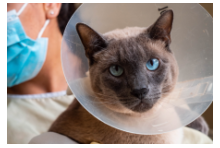In partnership with colony caretakers, who humanely capture and later release the cats, we perform spay and neuter surgeries on homeless, feral, and abandoned cats to help curb population growth. As part of the appointments, we also give the cats the appropriate vaccines and microchip them to improve their health and safety.
This Trap-Neuter-Return (TNR) program is typically run on a high-volume, high-quality model but, due to physical distancing requirements during the pandemic, we have had to reduce the number of surgeries performed while there are fewer staff members in the facility. Shelters everywhere are facing similar restrictions.
Funding will expand our capacity to perform spay/neuter surgeries by covering the staffing and consumable costs as we return to higher volumes post-shutdown. The average surgery cost to our organization is $80.
Community cats will have improved health and welfare and will no longer be able to produce unwanted litters. This is a one-time surgery that has lasting benefits, in addition to the other treatments (vaccines and microchips) that cats receive at the time of surgery.
Left unchecked, community cat populations can balloon out of control. Without population management, populations could grow by 18-20% per year (https://doi.org/10.1371/journal.pone.0113553). There are also many health benefits to a spay/neuter surgery. It reduces or removes the risk of disease, infection, and cancer of the animal’s reproductive system, and spayed and neutered animals have been proven to live longer lives. The biggest reason for reducing nationwide shelter intake and euthanasia over the past 15 years has been TNR and controlling the feral cat population. In fact, a recent study determined that there is a strong correlation between an increase in TNR and a decrease in stray intake (https://www.torontohumanesociety.com/pdfs/THS-EstimatingTheFeralCatPopul...).
Toronto Humane Society contributes to these efforts by running our TNR program. It not only contributes to controlling the population of community cats in the City of Toronto, but improves their health and welfare. This will also result in fewer cats being injured by vehicles.
The primary goals of the TNR program in particular are to improve the welfare of the animals we perform surgeries on, as well as to prevent unwanted litters.
However, the program fits into Toronto Humane Society’s overall strategy of improving animal welfare by addressing the root causes of poor animal welfare rather than simply reacting to animal vulnerability (see our 2020-2025 Strategic Plan, attached). It does so by focusing on preventative treatments, from spay/neuter to vaccines.
In conjunction with these activities, Toronto Humane Society also engages the public and promotes the importance of preventative and as-needed treatments such as spay/neuter for owned companion animals through our various communication channels, including:
Word of mouth: This remains our most effective method of communication, as our low-cost and subsidized services are well-known in the community and have a highly positive reputation.
Partner shelters: Our partner homeless and women’s shelters communicate the availability of our subsidized and free programs directly to their client base and refer them to us for appointments.
Toronto Humane Society communication channels: We post information on our website (torontohumanesociety.com) and regularly post information to our social media channels (Facebook, with 64.9k followers; Instagram, with 54.6k followers; Twitter, with 12.2k followers; and LinkedIn, with 1.5k followers). We also share information about our programs via our E-Newsletter, which has over 30k subscribers. Finally, we run the Pet Parent Support Network, which is a knowledge hub that provides community members with information and services they need to care for their pet and find alternatives to surrender, including learning about programs offered by Toronto Humane Society.
St James Town Food Bank: Beginning once the pandemic restrictions have lifted more, we plan to resume personally handing out pet food at our monthly pet food bank in St James Town in Toronto. St James Town is the largest high-rise community in Canada, and identified as one of 13 economically deprived neighbourhoods within the city. We communicate the availability of our services to clients who are using the food bank.
